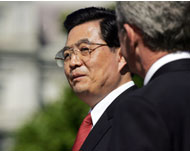Politics anchors Tibet railway
The opening of the world’s highest railway has given China’s leaders – especially President Hu Jintao – a political boost despite its enormous expense.

Hu declared the railway to Tibet open on Saturday in the Qinghai provincial city of Golmud, where the new 1,140km (720-mile) line to Lhasa begins.
The first train arrived in the Tibetan capital early on Sunday.
Saturday also marked the 85th anniversary of the ruling Communist Party which Hu also heads, a fact not lost on many Chinese.
“This is another magnificent accomplishment we have achieved in our socialist modernisation drive,” Hu said in his nationally televised speech from Golmud railway station.
“This success again shows the hardworking and wise people of China have the courage, confidence and ability to continue to create miracles,” he said.
“We also have the courage, confidence and ability to stand among the advanced peoples of the world.”
‘Propaganda campaign
Matt Whitticase, an activist with the Free Tibet Campaign, said that Hu’s presence at the ceremony underscored the political importance of the railway.
|
Golmud to Lhasa railway Elevated bridges over the most unstable tracts of permafrost. Sink pipes with cooling elements to ensure track embankments stay frozen Oxygen-enriched air in cabins to cope with the thin air Masks for oxygen beside every seat Double-paned windows to protect against ultraviolet radiation Anti-lightning equipment on the roof Televisions in first-class cabins Electric sockets for charging computers and cell phones Garbage containers with built-in compacting pressers Squat toilets with vacuum flush technology |
“Hu has given his unqualified backing to this project, due to the political prestige it will confer on his record as being the leader who realised the achievement of a long-standing aim of the party,” Whitticase said.
In the early days of the people’s republic, chairman Mao Zedong and prime minister Zhou Enlai fervently supported the building of a line linking China and Tibet.
However, the line only got as far as Golmud before it was suspended in the 1950s, due to a lack of funds.
Since China began its economic reform policies in 1978, after the disastrous cultural revolution from 1966-1976, every top leader has sought to put his stamp on grand construction projects – much like the feudal emperors who preceded them.
“There is an enormous propaganda campaign around the building of this train line,” said Gilles Guiheux, director of the Hong Kong-based French Centre for the Study of Contemporary China.
“This has been a giant political project but it is also the kind of giant project that typifies the Chinese, not only the Chinese Communist Party.
“It is not really an economic project, it is an extremely expensive operation that carries enormous prestige but is economically absurd.”
Enormous projects
Almost $4.5 billion has been invested in the project since construction began in 2001, with the last 1,000km posing enormous engineering challenges.
 |
|
Hu has reaped the benefits of |
The track must be anchored in frozen soil or permafrost and traverses a seismic zone.
But for Chinese leaders, their historical legacy is often linked to grand projects.
Deng Xiaoping, the architect of economic reform, built the booming special economic zones. His successor, Jiang Zemin, built up Shanghai and its new Pudong district as the nation’s financial hub.
For Hu, who came to power in 2003, it has largely been a question of collecting the fruits of other people’s labour.
Although he was not directly involved in planning China’s space programme, he successfully exploited for his own prestige the nation’s second manned space flight last October.
Corruption crackdown
The same can be said of the massive Three Gorges Hydroelectric Project, the world’s biggest dam, which was completed in May under Hu’s watch.
|
“Hu was involved in drafting the policies on Tibet that we see today, of fast-track economic development coupled with the repression of dissent” Kate Saunders, the International Campaign for Tibet |
Hu’s inauguration of the Tibet railway was not his first foray into Tibetan affairs. He was the region’s top leader during the late 1980s when its independence movement was severely suppressed.
Kate Saunders of the International Campaign for Tibet in the US capital, Washington DC, said: “Hu was involved in drafting the policies on Tibet that we see today, of fast-track economic development coupled with the repression of dissent.”
Hu’s current crackdown is on corruption among the communist party elite.
Jean-Luc Domenach, sinologist, referring to the official’s sacking on corruption charges last month, said: “What is important for him now is what just happened to the Beijing vice mayor.”
Hu said as much on Friday.
In a speech preceding the party anniversary, he pledged to intensify the fight against corruption amid a rash of scandals and arrests involving politicians, military officials and business leaders.